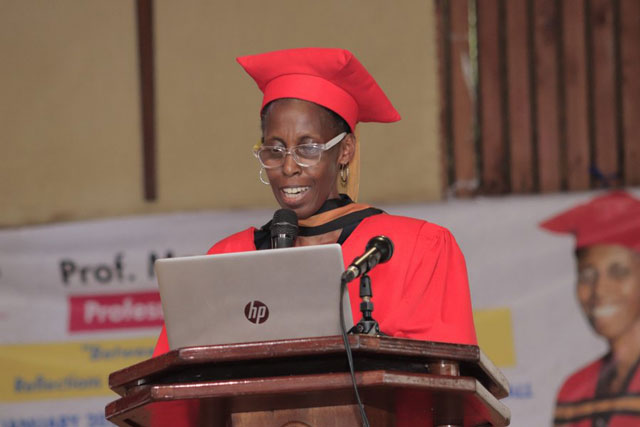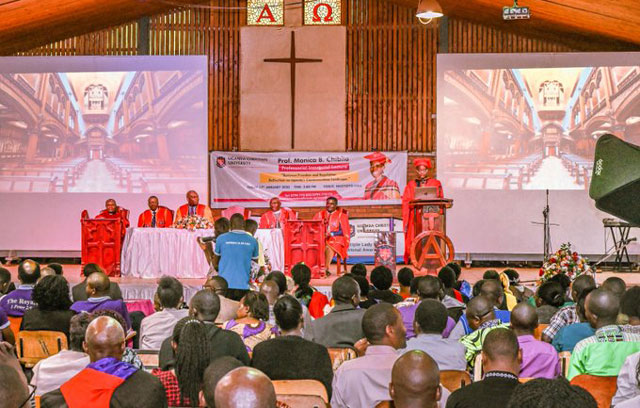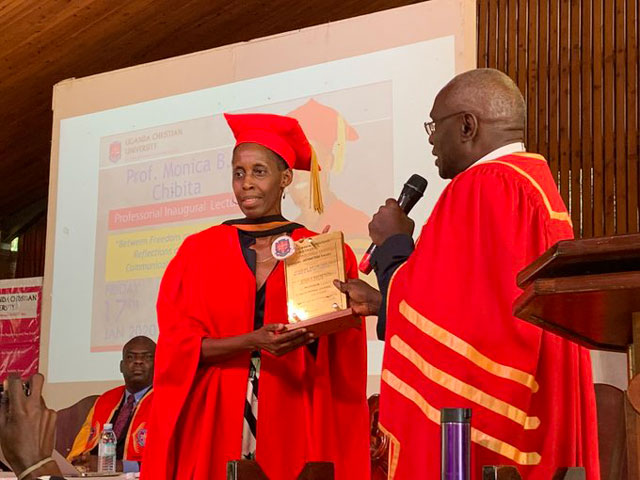
Kampala, Uganda | THE INDEPENDENT | Management of the fast-changing communication landscape in Uganda will have a bearing on the country’s democracy.
“A free communication landscape should contribute to a more informed polity. Such a polity should then be better equipped to hold their representatives accountable,” said Professor Monica Chibita on Friday January 17, 2020 as she delivered her Professorial Inaugural Lecture entitled “Between Freedom and Regulation: Reflection on Uganda’s Communication Landscape” at Uganda Christian University (UCU) in Mukono.
Hundreds of students, journalists, academicians and friends from the judiciary attended the ‘launch’ at Nkoyoyo hall.
Prof Chibita said it is difficult to have democracy without a free flow of information and accountability.
“People need information to participate meaningfully in debate and in decision-making. The way this emerging communication landscape is managed potentially has a bearing on our democracy,” she argued.
In her Inaugural Lecture, Prof Chibita examined Uganda’s regulatory environment, effects of media regulation, and the shift from the old analogue forms of communication to the digital. She also explained the changes in what audiences like to consume and how they want it served through new media, as well as dilemmas for regulation and diversity.

“Media freedom makes it possible for voices which are not all singing one chorus to be heard in and through the media. It facilitates the co-existence of divergent views,” Prof Chibita said.
“There should be evidence of tolerance of difference in the media. Otherwise we might as well go back to having one radio station, one TV station, and possibly one newspaper.”
Regulatory environment changing
Chibita argued that, if properly regulated, the media can play a key role in making democracy work by being a watchdog over those in power, facilitating open political debate on issues of governance and setting the agenda for policy-makers.
She said the regulatory environment is changing, even in Uganda, and warned that the “approach to regulation must also change, but must do so without encroaching on those freedoms already guaranteed in our constitution. The current media environment calls for innovative regulation, not repression and not resignation.”
Prof Chibita noted that because of new media, it has become difficult for regulators to identify who or what to regulate.
“While I do not advocate for totally eliminating state regulation of the communication sector, I am persuaded that it is time for the state to begin engaging partners to manage the new communication space more efficiently and in a way that fosters a free and diverse communication environment, for the sake of our democracy.”
She concluded, “I realise that we still have a long way to go in finding a solution for the regulation of the current communication environment in the public interest. Whether we choose to regulate or not to regulate, we risk throwing out the baby with the bath-water. ” (See full address bottom)

Who is Chibita?
Prof. Chibita, 56, is only the second homegrown full professor that the Uganda Christian University Council has promoted during the institution’s 22 years of existence.
“Dr Chibita has not only shown herself to be a consummate academic, but very importantly a leader who grows her team. During her time at UCU, she has worked to train five PhD’s in a partnership with two institutions in Norway and South Africa,” the UCU Council said in a statement eight months ago when they approved her promotion.
She is now also only the second Communications professor in the country after Dr Nassanga Goretti Linda, Professor at the Journalism and Communication Department, Makerere University.
“In proclaiming Dr Monica Chibita as a full professor, UCU is recognizing her excellence, her studiousness and academic research and therefore significant contribution to the body of knowledge in her display. The university organs right up to the university council spoke in unison in affirming that Dr Monica deserves and should be promoted to full professor,” UCU Vice Chancellor Dr Senyonyi said on Friday.
Professor is an academic rank at universities and other post-secondary education and research institutions in most countries. Literally, professor derives from Latin as a “person who professes.” Professors are experts in their field and teachers of the highest rank. Professors are expected to deliver an inaugural lecture in the first year of their appointment to let the public know about their research.
Chibita’s works
Her numerous research and academic works include a co-edited book, Salawu, A. and Chibita, Monica B. (eds.). 2015. Indigenous language media, language politics and democracy in Africa.
Outside teaching, Prof. Chibita has served on several boards including the Broadcasting Council, the African Centre for Media Excellence (ACME), the East African Communication Association, New Vision Printing and Publishing Corporation (Vision Group), World Vision Uganda and World Vision International. She currently chairs the board of ACME and and is Vice-Chair of the World Vision International Board..
She has co-edited the African Journal of African Media Studies since 2006, and sits on several other Journals’ Advisory Boards.
Some of her works have been published by Palgrave, Routledge, Rhodes Journalism Review, Journal of African Media Studies, African Journal of Communication, Wits University Press, Mawazo and Communicatio.
Swimming, singing, church and aerobics occupy the spare time of this mother of three boys and two girls, who is married to Mike Chibita, Uganda’s former Director of Public Prosecutions (DPP) and now Judge of the Supreme Court.
I now invite you to join me on a tour of the last part of this paper which focuses on the implications of all these changes for our democracy.
Prof Chibita Inaugural Lect… by The Independent Magazine on Scribd
 The Independent Uganda: You get the Truth we Pay the Price
The Independent Uganda: You get the Truth we Pay the Price





